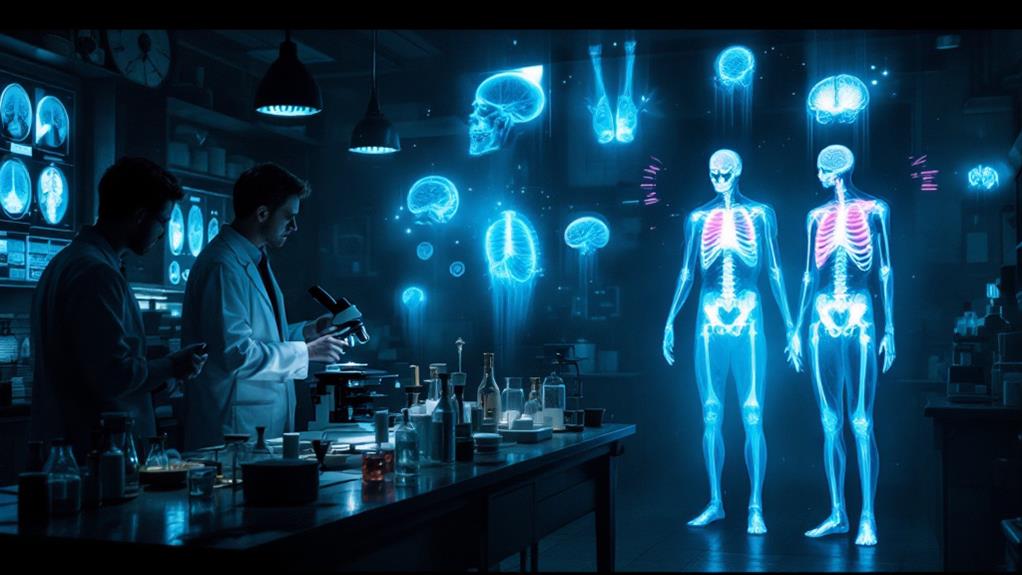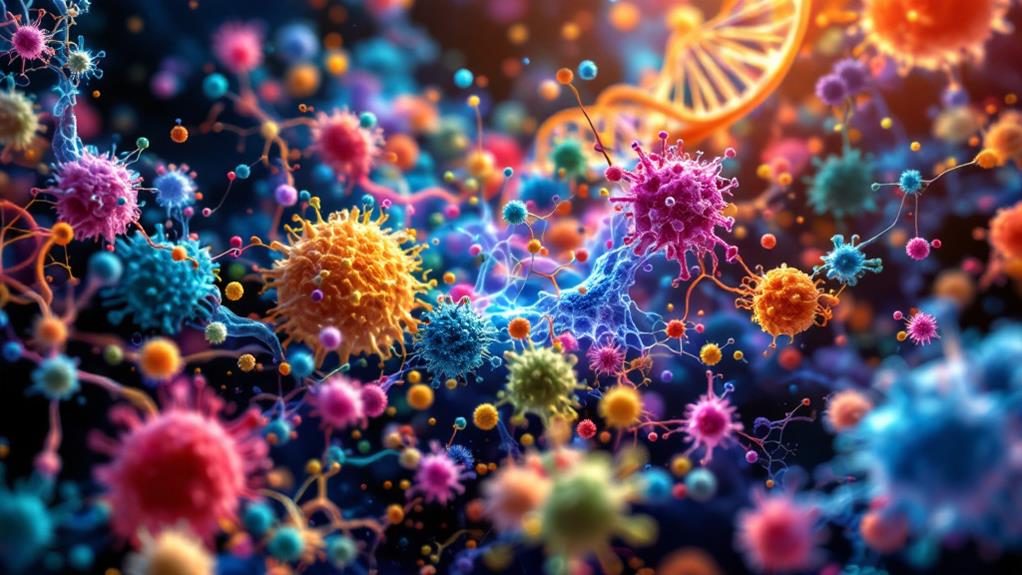A Comprehensive Guide to Cardiology: The Science of Heart Health
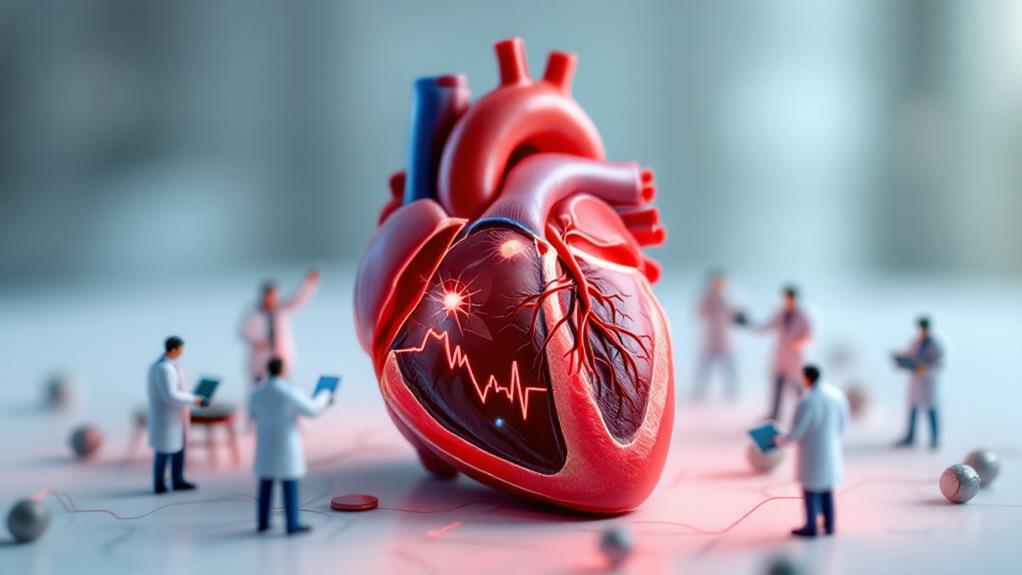
Cardiology, the science of heart health, encompasses the study of your heart's structure, function, and diseases. You'll learn about common cardiovascular conditions like coronary artery disease and hypertension, as well as state-of-the-art diagnostic tools such as ECGs and cardiac CT scans. Treatment options range from medications to surgical interventions like angioplasty and bypass grafting. Lifestyle factors play a pivotal role in maintaining heart health, including diet, exercise, and stress management. Emerging technologies, like AI-assisted diagnostics and remote monitoring, are revolutionizing cardiac care. By understanding these aspects, you'll be better equipped to safeguard your heart's well-being and investigate the fascinating world of cardiovascular medicine.
Heart Anatomy and Function
The heart is a muscular organ about the size of your fist, located slightly left of center in your chest. It's responsible for pumping blood throughout your body, providing oxygen and nutrients to tissues while removing waste products. The heart's structure consists of four chambers: two upper atria and two lower ventricles. Blood flows from the atria to the ventricles, then out to the body and lungs.
The heart chambers structure is essential for efficient blood circulation. The right side of the heart receives deoxygenated blood from the body and sends it to the lungs, while the left side receives oxygenated blood from the lungs and pumps it to the rest of the body. Heart valve mechanics play a critical role in ensuring proper blood flow direction. Four valves - the tricuspid, pulmonary, mitral, and aortic - open and close in a coordinated manner to prevent backflow.
Your heart beats about 100,000 times a day, pumping approximately 2,000 gallons of blood. This continuous activity is maintained by the heart's electrical system, which generates impulses that cause the muscle to contract rhythmically.
Common Cardiovascular Diseases
Affecting millions worldwide, cardiovascular diseases pose a significant threat to heart health. You'll find that these conditions range from common issues like coronary artery disease and hypertension to less frequent but equally serious problems such as hypertrophic cardiomyopathy and rheumatic heart disease.
Coronary artery disease, characterized by plaque buildup in your arteries, can lead to heart attacks and angina. Hypertension, or high blood pressure, silently damages your blood vessels and heart over time. Atrial fibrillation, an irregular heartbeat, increases your risk of stroke and heart failure.
Heart valve diseases, including those caused by rheumatic heart disease, can disrupt normal blood flow through your heart. Cardiomyopathies, like hypertrophic cardiomyopathy, affect your heart muscle's ability to pump blood effectively. Congenital heart defects, present at birth, can range from minor to life-threatening.
You can reduce your risk of many cardiovascular diseases through lifestyle changes such as maintaining a healthy diet, exercising regularly, avoiding tobacco, and managing stress. Regular check-ups and early detection are essential in preventing and treating these conditions effectively.
Diagnostic Tools in Cardiology
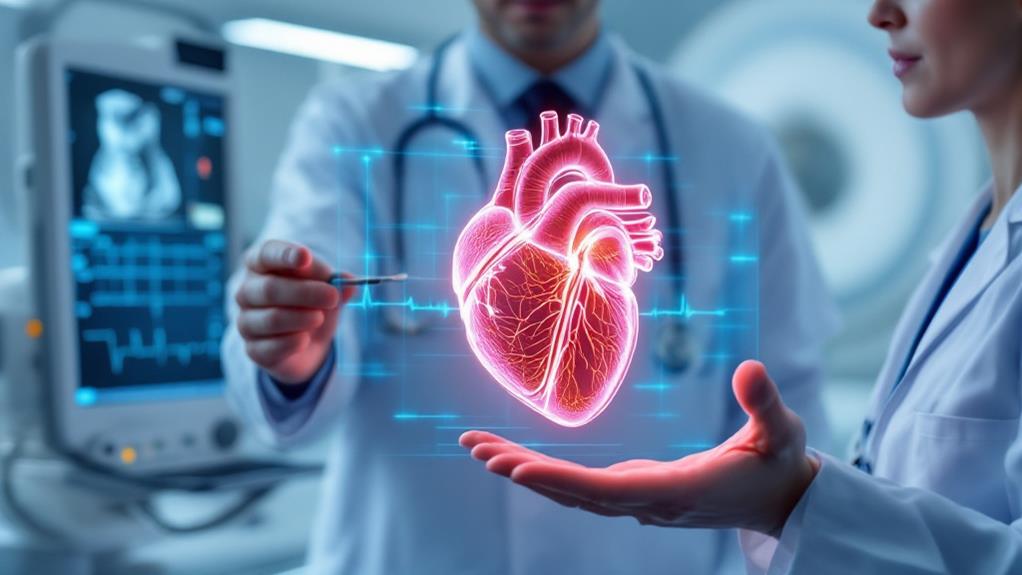
Modern cardiology relies on a wide array of diagnostic tools to pinpoint heart issues accurately. You'll encounter various tests during a cardiac evaluation, each designed to provide specific understandings into your heart's function.
The electrocardiogram (ECG) is often the first test you'll undergo. It records your heart's electrical activity, allowing for electrocardiogram interpretation that can reveal arrhythmias, heart attacks, or other cardiac abnormalities. Echocardiograms use ultrasound to create real-time images of your heart, showing its structure and function.
Cardiac imaging modalities have revolutionized diagnostics. You might need a cardiac CT scan, which provides detailed 3D images of your heart and blood vessels. MRI offers high-resolution images without radiation exposure, ideal for evaluating heart muscle damage or congenital defects. Nuclear stress tests use radioactive tracers to evaluate blood flow to your heart, particularly useful in diagnosing coronary artery disease.
For a more invasive look, your cardiologist may recommend cardiac catheterization. This procedure allows direct examination of your coronary arteries and can measure pressures within your heart chambers. These tools, combined with blood tests and your medical history, help your doctor accurately diagnose and treat your heart condition.
Treatments and Interventions
Customized to each patient's specific cardiac condition, treatments and interventions in cardiology range from lifestyle modifications to complex surgical procedures. Your cardiologist will develop a personalized plan that may include medication management, minimally invasive techniques, or open-heart surgery, depending on the severity and nature of your heart issue.
Common treatments and interventions in cardiology include:
- Prescribed medications to manage blood pressure, cholesterol, or heart rhythm
- Angioplasty and stenting to open blocked arteries
- Pacemaker or defibrillator implantation for heart rhythm disorders
- Coronary artery bypass grafting (CABG) for severe coronary artery disease
You'll work closely with your healthcare team to determine the most effective treatment approach. This may involve a combination of lifestyle changes, such as adopting a heart-healthy diet and regular exercise routine, along with medical interventions. In some cases, you might need to undergo surgical procedures to repair or replace damaged heart valves, correct congenital defects, or address other structural issues. Your cardiologist will monitor your progress and adjust your treatment plan as needed, ensuring you receive the most appropriate care for your specific cardiac condition.
Lifestyle Factors for Heart Health
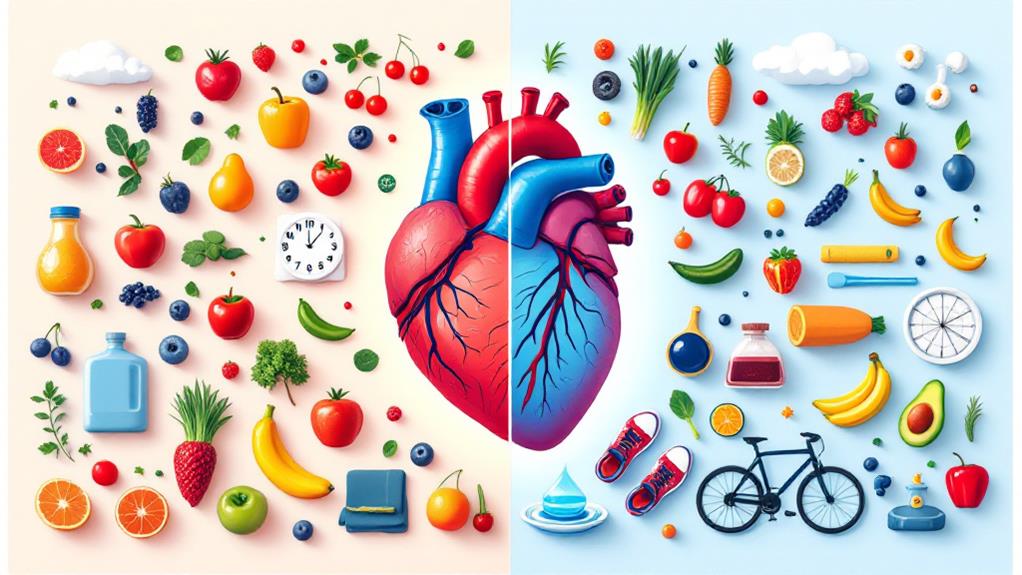
While medical interventions play a vital role in managing heart conditions, lifestyle factors can greatly impact your cardiovascular health. You can considerably reduce your risk of heart disease by adopting heart-healthy habits. Start by focusing on your diet and nutrition. Consume a balanced diet rich in fruits, vegetables, whole grains, and lean proteins. Limit your intake of saturated fats, trans fats, and added sugars. Incorporate heart-healthy fats like those found in fish, nuts, and olive oil.
Regular physical activity is essential for maintaining a healthy heart. Aim for at least 150 minutes of moderate-intensity exercise or 75 minutes of vigorous-intensity exercise per week. Combine aerobic activities with strength training for ideal benefits. Don't forget about stress management, as chronic stress can negatively affect your heart health. Practice relaxation techniques such as meditation, deep breathing, or yoga to reduce stress levels. Additionally, prioritize quality sleep, as poor sleep habits can contribute to heart problems. Aim for 7-9 hours of sleep per night. Finally, if you smoke, quitting is one of the most important steps you can take to protect your heart.
Emerging Technologies in Cardiac Care
Recent advancements in technology have revolutionized cardiac care, offering new hope for patients with heart conditions. You'll find cutting-edge innovations that are transforming diagnosis, treatment, and monitoring of heart diseases. Remote patient monitoring systems now allow doctors to track your heart health in real-time, even when you're at home. This technology enables early detection of potential issues and quick intervention.
Artificial intelligence applications are making waves in cardiac care. They're helping interpret complex imaging data, predict outcomes, and personalize treatment plans. You'll benefit from more accurate diagnoses and tailored therapies thanks to these AI-powered tools.
Some emerging technologies in cardiac care include:
- 3D-printed heart models for surgical planning
- Robotic-assisted minimally invasive procedures
- Wearable devices for continuous heart rhythm monitoring
- Gene therapy for treating inherited heart conditions
These advancements are improving outcomes, reducing recovery times, and enhancing your quality of life. As research continues, you can expect even more innovative technologies to emerge, further revolutionizing cardiac care. Stay informed about these developments, as they might play a vital role in your heart health journey.
Pediatric Cardiology

Pediatric cardiology focuses on heart health in infants, children, and adolescents. This specialized field deals with a wide range of heart conditions that can affect young patients, from birth through their teenage years. You'll find that congenital heart defects are a primary concern in this area, as they're present at birth and can vary greatly in severity and complexity.
As a parent or caregiver, you might encounter terms like atrial septal defect, ventricular septal defect, or tetralogy of Fallot. These are just a few examples of the many congenital heart defects that pediatric cardiologists diagnose and treat. They use advanced imaging techniques, such as echocardiograms and cardiac MRIs, to visualize and assess the heart's structure and function.
Pediatric arrhythmias, or irregular heartbeats, are another vital aspect of this field. Your child's cardiologist may use electrocardiograms (ECGs) or Holter monitors to detect and diagnose these rhythm disturbances. Treatment options can range from medication to minimally invasive procedures, depending on the specific condition and its severity.
Future of Cardiovascular Medicine
On the horizon of cardiovascular medicine, pioneering advancements are set to revolutionize heart care. You'll witness the integration of precision medicine, tailoring treatments to your unique genetic makeup and lifestyle factors. Remote patient monitoring will become more sophisticated, allowing your doctor to track your heart health in real-time from afar.
The future of cardiovascular medicine promises:
- Artificial intelligence-driven diagnostics for faster, more accurate heart disease detection
- 3D-printed heart tissue and organs for transplantation
- Nanotechnology-based drug delivery systems for targeted treatments
- Gene editing techniques to prevent inherited heart conditions
You'll benefit from these innovations as they lead to more personalized and effective treatments. Envision a world where your smartwatch detects early signs of heart trouble, alerting your doctor before symptoms appear. Or where a simple blood test can predict your risk of heart attack years in advance. As research progresses, you'll see a shift towards preventive care, with interventions designed to stop heart disease before it starts. The future of cardiovascular medicine is bright, offering hope for better outcomes and improved quality of life for heart patients worldwide.
